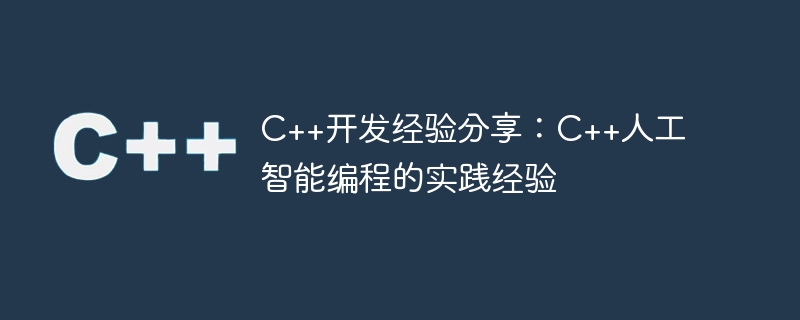Home >Backend Development >C++ >C++ development experience sharing: Practical experience in C++ artificial intelligence programming
C++ development experience sharing: Practical experience in C++ artificial intelligence programming
- PHPzOriginal
- 2023-11-22 16:00:261594browse

In the field of artificial intelligence, C is a very commonly used programming language, and its optimization capabilities and efficiency are excellent when processing large-scale data. However, developing artificial intelligence applications is not an easy task. In practical experience, there are some techniques and tools that can help developers perform C artificial intelligence programming more efficiently. This article will share some practical experiences in this regard.
- STL library
STL is part of the C standard library. It is a powerful and widely used toolset that contains many data structures and algorithms, including vectors, Hash tables, stacks, queues, etc. For programmers who are already familiar with the STL library, these containers and algorithms can be very convenient to implement the needs of various artificial intelligence applications.
- Smart pointers
A common problem is that when processing large amounts of data, programs often require large amounts of dynamic memory allocation. Of course, in order to avoid memory leaks and garbage collection problems, we usually use dynamic memory allocation and manually delete the memory using the standard delete keyword, but this method is prone to problems and is usually troublesome.
A smart pointer is a class that can automatically call the delete operator to prevent memory leaks and duplicate deletions, which is very necessary for large-scale artificial intelligence applications. std::unique_ptr is a typical smart pointer, which guarantees that only one pointer points to a certain object, while std::shared_ptr allows multiple pointers to point to the same object.
- Matrix operations
Matrix operations are one of the basic operations for processing artificial intelligence applications. They process the data structures of matrices and vectors through algebraic methods. For example, in neural networks, matrix operations are used to calculate weights and biases, and to transform neuron states, which require efficient and accurate matrix calculations.
BLAS (Basic Linear Algebra Subprograms) is an efficient matrix operation library. Since BLAS is developed by Fortran language, some additional settings are required for use in C. However, once installed successfully, BLAS is a A very powerful tool that can significantly improve the performance of matrix operations.
- Open Source Library
Another important practical strategy is to use open source libraries, which is very common in the field of artificial intelligence. Using open source libraries can greatly reduce the workload of repeated coding. At the same time, open source libraries are usually fully tested and optimized, which means that the code quality is higher and it is easier to maintain and expand.
For example, in computer vision, OpenCV is a very useful library that provides many functions and algorithms for image processing, computer vision, and machine learning. In addition, in natural language processing, Stanford CoreNLP and CMU Sphinx are very famous libraries, which provide various text processing and natural language processing algorithms and functions.
- Integrated Development Environment (IDE)
Finally, a powerful and reliable integrated development environment (IDE) is very important, it can make C artificial intelligence programming become It's easier and smoother. For example, both Visual Studio and Eclipse provide complete C development environments and include various debuggers and code detection tools, which can help developers quickly locate problems and optimize them.
In short, C artificial intelligence programming is not an easy task, but in practical experience, we can improve efficiency and quality through the above technologies and tools. By proficiently using STL libraries, smart pointers, matrix operations, open source libraries, etc., and choosing a suitable development environment, we can more effectively build high-performance, stable and scalable C artificial intelligence applications.
The above is the detailed content of C++ development experience sharing: Practical experience in C++ artificial intelligence programming. For more information, please follow other related articles on the PHP Chinese website!

